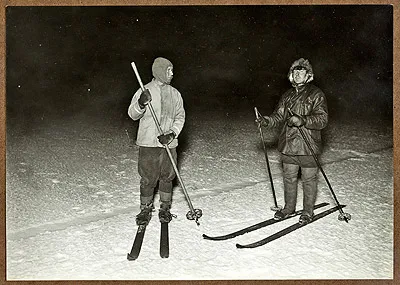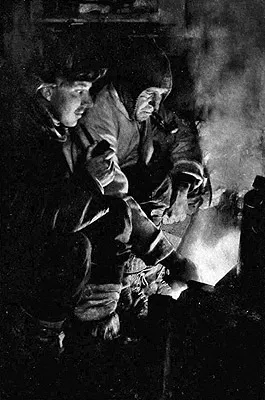Cecil Henry Meares - in charge of dogs, Russian interpreter,
1877 - 1937
Biographical notes
Dog handler Terra Nova 1910-13
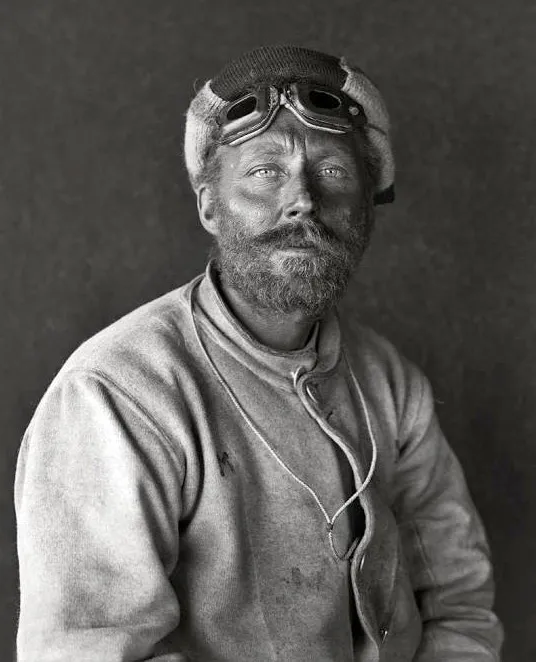
Cecil Meares
1877 - 13th May 1937
Born in County Kilkenny, Ireland, the son of a British Army officer and educated in Scotland and England, Meares was an adventurer who followed his own path. He had left school at 17 and prior to Scott's expedition had been a British army officer, had fought in the Boer war had been an observer in the Russo-Japanese War and a surveyor in Manchuria, during which time there are suggestions that he may have been engaged in intelligence and diplomatic work, he had been in Peking during the Boxer Uprising.
Meares had also been a fur trader in the wildest and furthest flung parts of Russia and travelled to a number of little visited places such as Tibet until his companion was killed at which point he returned to England and volunteered for Scott's expedition.
Scott's by-the-book naval command structure didn't sit too comfortably with him.
He was tasked by Scott to buy 34 dogs and 20 ponies for the expedition, he knew little about ponies though went to Siberia as instructed to obtain them and transported them to New Zealand.
Oates who was in charge of the ponies in Antarctica described them as:
"greatest lot of crocks I have ever seen".
While in Siberia Meares recruited an experienced dog driver, Dmitriy Girev and a groom, Anton Omelchenko to help select the animals and accompany them to Antarctica.
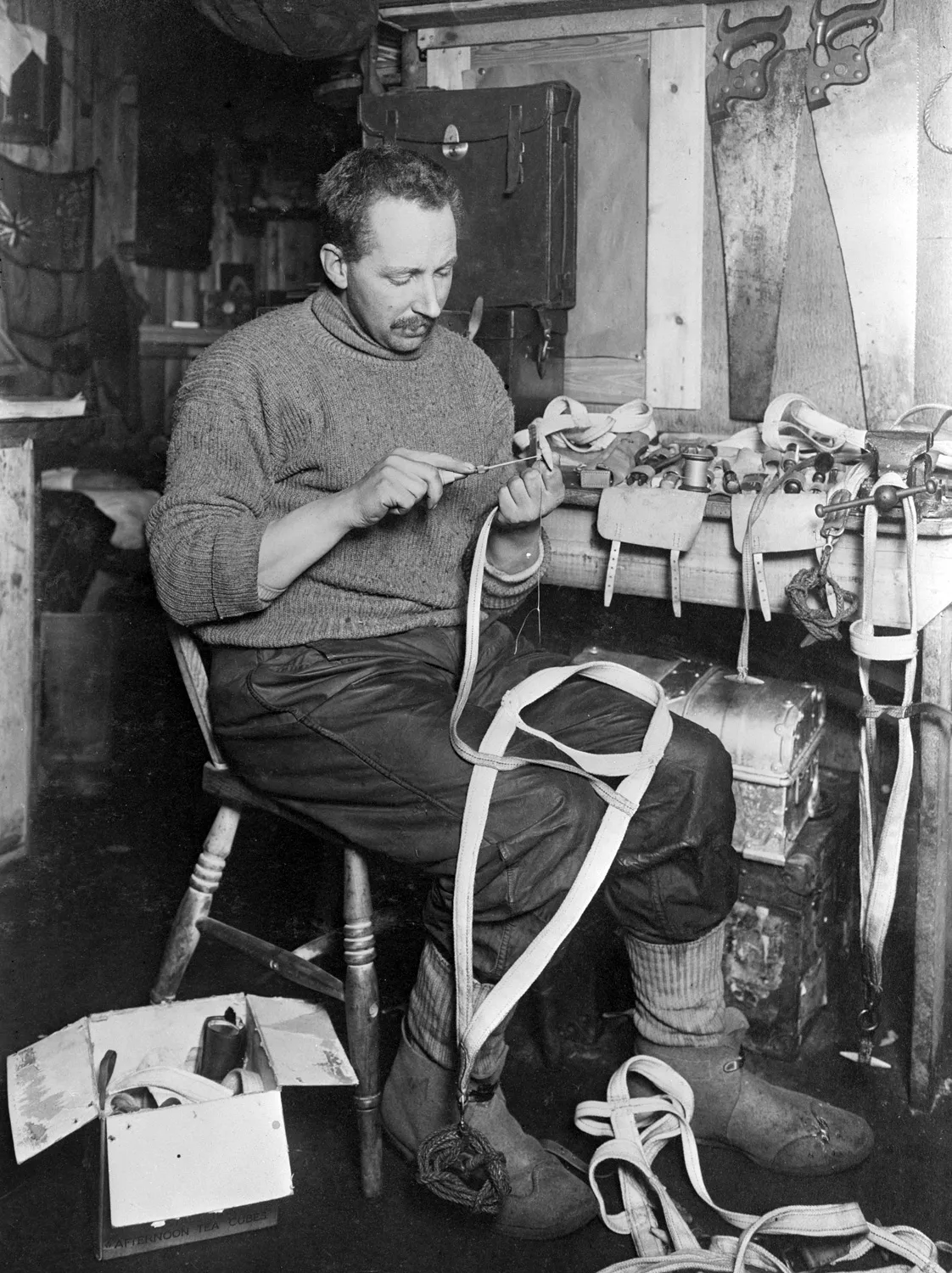
Cecil Meares making a dog harness
Meares took part in depot laying journeys with the dogs, scouting and moving stores about from camp to camp. He set off with Girev and two dog teams on the 4th of November 1911 to accompany and support Scott on his journey to the pole, they were turned back on the 14th of December at the foot of the Beardmore glacier. Once back at the expedition hut he resigned from the expedition in early 1912 for reasons that are not clearly recorded, he returned home on the Terra Nova in March that year on its summer relief voyage. Scott hints that he may have been awaiting news brought by the ship and he may have returned to England following the death of his father.
He was "unavailable" for for further work after resigning and before leaving, a period of two months when his skills were required, jobs he would have done were carried out by others, notably Cherry-Garrard and Girev's trip to "One Ton Depot" leaving at the end of February where they awaited Scott and the Polar Party. The Terra Nova left Cape Evans on the 3rd of March while Cherry-Garrard and Girev didn't arrive back until the 15th of March, so if Meares were to have gone to One Ton Depot he would have missed the ship home and at the time there was no particular concern for the Polar Party.
In the First World War Meares Victoria, British Columbia, Canada where he lived until he died in 1937. Following the death of his wife in 1976, - here
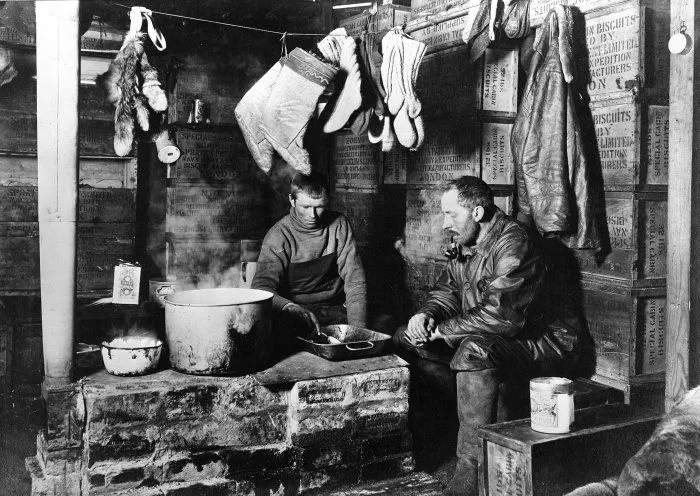
Cecil Meares and Dmitriy Girev
by the blubber stove Discovery Hut, at Hut Point
References to Cecil Meares by Cherry-Garrard in "The Worst Journey in the World"
-
The leading rope was very small and I was fearful of its breaking, so Meares was lowered down a foot or two to secure the Alpine rope to the leading end of the trace; this done, the work of rescue proceeded in better order. Two by two we hauled the animals up to the sledge and one by one cut them out of their harness. Strangely the last dogs were the most difficult, as they were close under the lip of the gap, bound in by the snow-covered rope. Finally, with a gasp we got the last poor creature on to firm snow. We had recovered eleven of the thirteen.
-
The table was cleared after supper and we sat round it for these lectures three times a week. There was no compulsion about them, and the seamen only turned up for those which especially interested them, such as Meares' vivid account of his journeyings on the Eastern or Chinese borderland of Thibet. This land is inhabited by the 'Eighteen Tribes,' the original inhabitants of Thibet who were driven out by the present inhabitants, and Meares told us chiefly of the Lolos who killed his companion Brook after having persuaded him that they were friendly and anxious to help him. "He had no pictures and very makeshift maps, yet he held us really entranced for nearly two hours by the sheer interest of his adventures. The spirit of the wanderer is in Meares' blood: he has no happiness but in the wild places of the earth. I have never met so extreme a type. Even now he is looking forward to getting away by himself to Hut Point, tired already of our scant measure of civilization.
-
Oates and Seaman Evans had quite a crop of frost-bites. I pointed out to Meares that his nose was gone; but he left it, saying that he had got tired of it, and it would thaw out by and by.
-
All three parties off the plateau owed a good deal to Meares, who, on his return with the two dog-teams, built up the cairns which had been obliterated by the big blizzard of December 5-8. The ponies' walls were drifted level with the surface, and Meares himself had an anxious time finding his way home. The dog tracks also helped us a good deal: the dogs were sinking deeply and making heavy weather of it.
-
At the Barrier Depots we found rather despondent notes from Meares about his progress. To the Southern Barrier Depot he had uncomfortably high temperatures and a very soft surface, and found the cairns drifted up and hard to see. At the Middle Barrier Depot we found a note from him dated December 20. "Thick weather and blizzards had delayed him, and once he had got right off the tracks and had been out from his camp hunting for them.
-
Before we left Scott at the top of the Beardmore he gave him orders to take the two dog-teams South in the event of Meares having to return home, as seemed likely. This was not meant in any way to be a relief journey. Scott said that he was not relying upon the dogs; and that in view of the sledging in the following year, the dogs were not to be risked.
-
Before she left for New Zealand the following members of our company joined the ship: Simpson, who had to return to his work in India; Griffith Taylor, who had been lent to us by the Australian Government for only one year; Ponting, whose photographic work was done; Day, whose work with the motors was done; Meares, who was recalled by family affairs; Forde, whose hand had never recovered the effects of frost-bite during the spring; Clissold, who fell off a berg and concussed himself; and Anton, whose work with the ponies was done. Lieutenant Evans was invalided home.
References to Cecil Meares by Scott in "Scott's Last Expedition"
-
We have managed to wedge in all the dog biscuits, the total weight being about 5 tons; Meares is reluctant to feed the dogs on seal, but I think we ought to do so during the winter.
-
The teams are pulling very well, Meares' especially. The animals are getting a little fierce. Two white dogs in Meares' team have been trained to attack strangers--they were quiet enough on board ship, but now bark fiercely if anyone but their driver approaches the team. They suddenly barked at me as I was pointing out the stopping place to Meares, and Osman, my erstwhile friend, swept round and nipped my leg lightly. I had no stick and there is no doubt that if Meares had not been on the sledge the whole team, following the lead of the white dogs, would have been at me in a moment.
-
Meares has a bad attack of snow blindness in one eye. I hope this rest will help him, but he says it has been painful for a long time.
-
Yesterday we marched up the depot, Mt. Hooper. Cold comfort. Shortage on our allowance all round. I don't know that anyone is to blame. The dogs which would have been our salvation have evidently failed. Meares had a bad trip home I suppose.
Landmarks named after Cecil Meares
Feature Name:
Meares Cliff
Type: cliff
Latitude:
71°12'S
Longitude: 168°25'E
Description: An angular coastal cliff that
rises to 600 m, located 5.5 mi WNW of Nelson Cliff along the
N coast of Victoria Land. First charted by the Northern Party,
led by Campbell, of the British Antarctic Expedition (BrAE),
1910-13. Named by Campbell for Cecil H. Meares who had charge
of the dogs on this expedition.
Other Crew of the Terra Nova Expedition
Abbot,
George Percy - Petty Officer, R.N. - 1, 2, N
Atkinson, Edward
L. - R.N. - surgeon, parasitologist - 1, 2, D, P, S
Balson,
Albert - Leading seaman, R.N.- 1, 2
Bowers,
Henry Robertson - Lieutenant - 1, 2, D, C,
Po
Browning,
Frank Vernon - Petty Officer - 1, 2, N
Campbell,
Victor - Lieutenant, R.N. - 1, 2, N
Cheetham,
Alfred B. - Boatswain (Bosun), R.N.R.
Cherry-Garrard,
Apsley - Assistant zoologist - 1, 2, D, C, S
Crean,
Tom - petty officer, R.N. - 1, 2, D, P, S
Debenham, Frank
- Geologist - 1, 2, iW, iiW
Dickason,
Harry - Able Seaman - 1, 2, N
Evans, Edgar - petty
officer, R.N. - 1, iW, Po
Evans, Edward R.G.R. - Lieutenant, R.N. "Teddy Evans" -
second in command, and Captain of the Terra Nova - 1, D, P
Girev
(Geroff), Dmitriy - Dog driver - 1, 2, D, P, S
Gran,
Tryggve - ski expert - 1, 2, D, iiW, S
Lashly, William
- chief stoker, R.N. - 1, 2, P, S
Levick,
G. Murray - Surgeon, R.N. - 1, 2, N
Lillie, Dennis Gascoigne - Biologist
on the ship
McLeod, Thomas
F. - Able seaman - 1, 2
Meares, Cecil
H. - in charge of dogs - 1, D, P
Oates, Lawrence
- Capt. 6th Iniskilling Dragoons - 1, D,
Po
Ponting,
Herbert G. - Camera artist - 1
Priestley,
Raymond E. - Geologist - 1, 2, N
Omelchenko,
Anton - Groom - 1
Scott, Robert
Falcon - Commander, R.N. -
Expedition leader - 1, D, Po
Simpson,
George - Meteorologist - 1
Taylor,
T. Griffith - Geologist - 1, iW, iiW
Wilson,
Edward Adrian - chief of scientific staff and biologist - 1, D, C,
Po
Wright,
Charles Seymour - Physicist - 1, 2, iW, P, S
Key:
1 - first winter
2 - second winter
iW - first western party
iiW - second western party
N - northern
party
D - depot laying for south pole journey
P - south pole party
C - winter journey to Cape Crozier
S - search party for south Pole
party
Po - reached
South Pole
Biographical information
- I am concentrating on the Polar experiences of the men involved.
Any further information or pictures visitors may have will be gratefully received.
Please email
- Paul Ward, webmaster.
What are the chances that my ancestor was an unsung part of the Heroic Age
of Antarctic Exploration?

